Sometimes it feels like no matter what you do, pond algae just keeps coming back. You clean, you skim, you even try those quick-fix treatments, but that green slime always finds a way to take over. It can be frustrating watching your pond turn cloudy or your fish struggle in water that doesn’t look healthy. That’s probably why you’re searching for fish that eat algae in ponds a natural way to keep things under control.
The good news is, you’re in the right place. In this blog, we’ll go over the best pond fish and other pond life that actually help reduce algae growth. You’ll learn which species are the most effective, what conditions they thrive in, and how to make sure they fit well into your pond’s ecosystem. By the end, you’ll have a clear idea of which algae-eating fish can help you enjoy a cleaner, healthier pond without the stress.
Different Types of Pond Algae
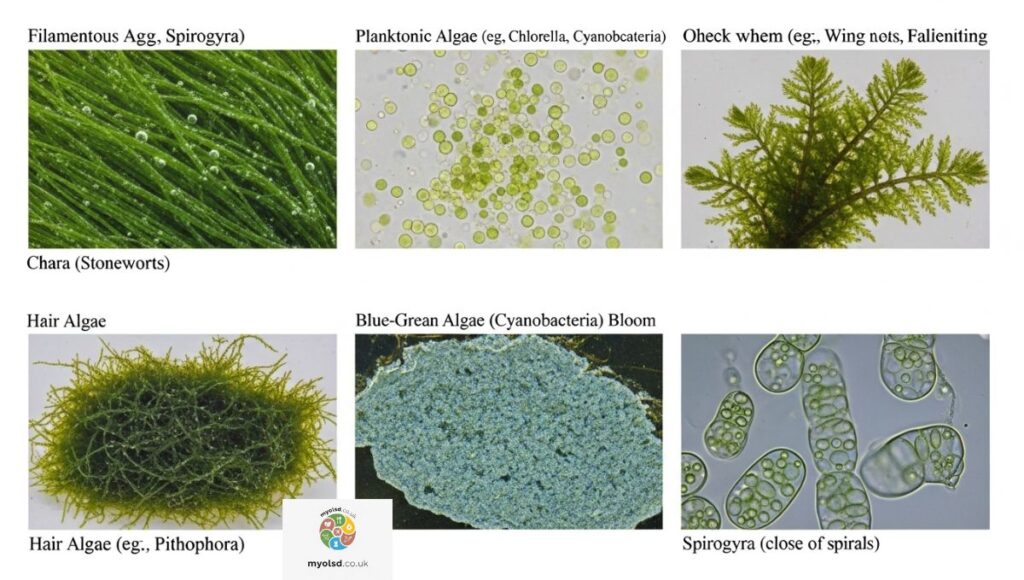
Before picking algae-eating fish, it helps to know what you’re fighting. Pond algae isn’t all the same. Some types float freely in the water, while others cling to rocks or form thick mats on the surface.
- Planktonic algae gives water that murky, pea-soup look.
- String algae and blanket weed form long green threads that tangle around plants and pumps.
- Blue-green algae, technically a bacteria, can release toxins harmful to fish and even pets.
Each type responds differently to control methods. Fish may happily nibble on soft filamentous algae but ignore slimy blue-green mats. That’s why choosing the right mix of fish, plants, and pond care practices is key.
Best Practices for Introducing Algae Eating Fish to Your Pond
Adding algae eaters isn’t as simple as dumping them in and hoping for the best. First, think about your pond size, water conditions, and whether existing species will get along with newcomers. Overstocking leads to more fish waste and excess nutrients, which can actually fuel more algae growth.
It’s also important to make sure your pond has enough oxygen levels. Use aeration or an external pond filter if needed. Introduce fish gradually so they can adapt without stress. And remember algae-eating fish supplement pond care but don’t replace regular pond maintenance like skimming leaves, checking nutrient levels, or using beneficial bacteria treatments.
Read more Article:Kias That Can Tow
The 10 Best and Most Effective Algae-Eating Fish for Ponds
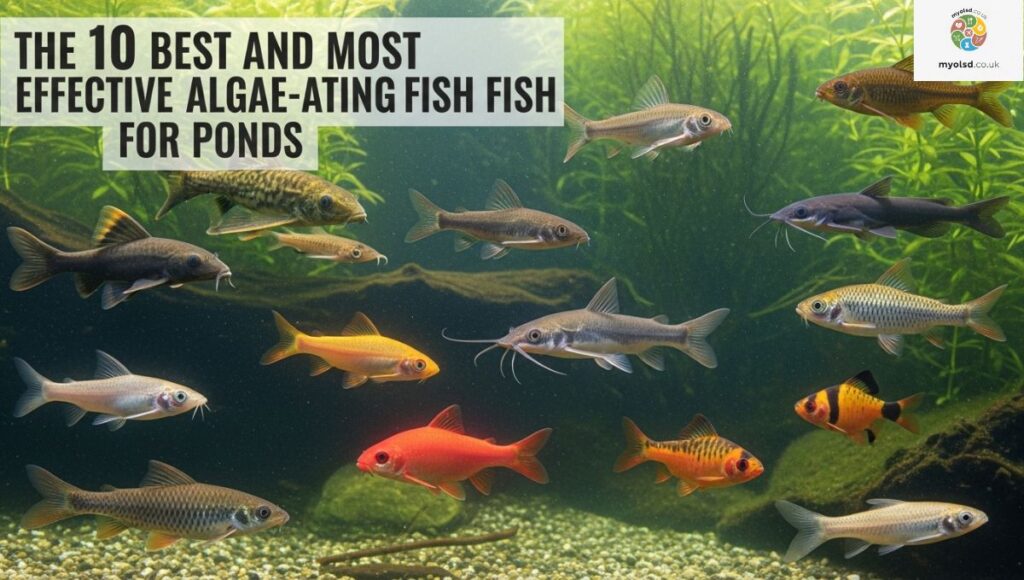
Some fish are better algae cleaners than others. Below are the most effective options pond keepers swear by.
1 – KOI
Koi are one of the most popular pond fish. While they aren’t the most aggressive algae eaters, they do graze on soft growth along rocks and pond liners. Their real strength is how well they fit into a balanced pond ecosystem.
Key Points: Koi are hardy and thrive in outdoor ponds, even in cooler climates.
Pros: Attractive, long lifespan, peaceful with other species.
Cons: Can stir up the pond floor, making water cloudy.
2 – GOLDEN FISH (Goldfish)
Goldfish are classic algae eater fish that happily nibble on soft algae. They also help by consuming uneaten food and debris.
Key Points: Easy to keep and breed in most pond sizes.
Pros: Affordable, colorful, compatible with koi and mollies.
Cons: Can overpopulate if not managed.
3 – MOLLY FISH
Mollies—including sailfin, dalmatian, and balloon varieties are great community fish. They graze on soft algae and even help with mosquito larvae.
Key Points: Best in warmer temperatures around 70 to 80°F.
Pros: Small, peaceful, breed easily.
Cons: Don’t tolerate cold climates without a pond heater.
4 – Japanese Trapdoor Snail
Not technically a fish, but one of the best pond cleaners you can add. Trapdoor snails consume algae on rocks, plants, and pond liner surfaces.
Key Points: Live-bearing snails that won’t overrun your pond.
Pros: Natural, low-maintenance, long-lived.
Cons: Vulnerable to predators like koi.
5 – DOJO LOACH
Also called the weather loach, this bottom feeder scavenges algae, debris, and leftover food. They’re hardy and can handle cold weather better than mollies or guppies.
Key Points: Burrow into the pond floor when stressed.
Pros: Great for cooler climates, peaceful.
Cons: Can hide often, so you may not see them much.
6 – GRASS CARP
These fish are sometimes called “the lawnmowers of ponds.” They devour aquatic weeds and string algae quickly.
Key Points: Can grow up to 50 cm and live more than 10 years.
Pros: Extremely effective for algae control.
Cons: In some regions you need a state permit to stock them.
7 – MOSQUITO FISH
Tiny but mighty, mosquito fish not only eat algae but also reduce mosquito larvae. They’re especially handy for water gardens and smaller ponds.
Key Points: Livebearers that reproduce quickly.
Pros: Hardy, low-maintenance, great natural pest control.
Cons: Can outcompete native species if released into wild waters.
8 – Bullfrog Tadpole
Unusual but effective, tadpoles eat large amounts of soft algae during their growth stage.
Key Points: They transform into frogs, which may leave the pond.
Pros: Eat algae and add biodiversity.
Cons: Temporary solution since they stop grazing as adults.
9 – Siamese Algae Eater
These active fish are famous for eating stubborn string algae. They’re also peaceful, making them great in a community set-up.
Key Points: Fast swimmers, best in medium to large ponds.
Pros: Tackle algae most fish ignore.
Cons: Need stable water conditions.
10 – Plecostomus (Common Pleco)
One of the best-known algae sucker fish. Large plecos clean pond walls and rocks efficiently but need space.
Key Points: Can reach over 28 cm, so a pond of at least 250 liters is needed.
Pros: Powerful algae eaters, hardy.
Cons: Produce lots of waste, need warmer water.
11 – Triploid Grass Carp – The Algae Mower
A special sterile variety used specifically for algae control. They eat continuously, keeping weeds and filamentous algae in check.
Key Points: Often used in large ponds and lakes.
Pros: Super effective, can cover wide areas.
Cons: Only suitable for large ponds (1000 gallons+).
12 – Otocinclus – Small but Mighty
Also called “otos,” these tiny catfish are excellent for nibbling on soft green algae. Perfect for smaller ponds or as part of a larger algae-eating crew.
Key Points: Peaceful, need groups of at least 3 to 5.
Pros: Great for delicate aquascaping setups.
Cons: Sensitive to poor water quality.
Read more Article:Kias That Can Tow
Why Use Fish to Control Algae?
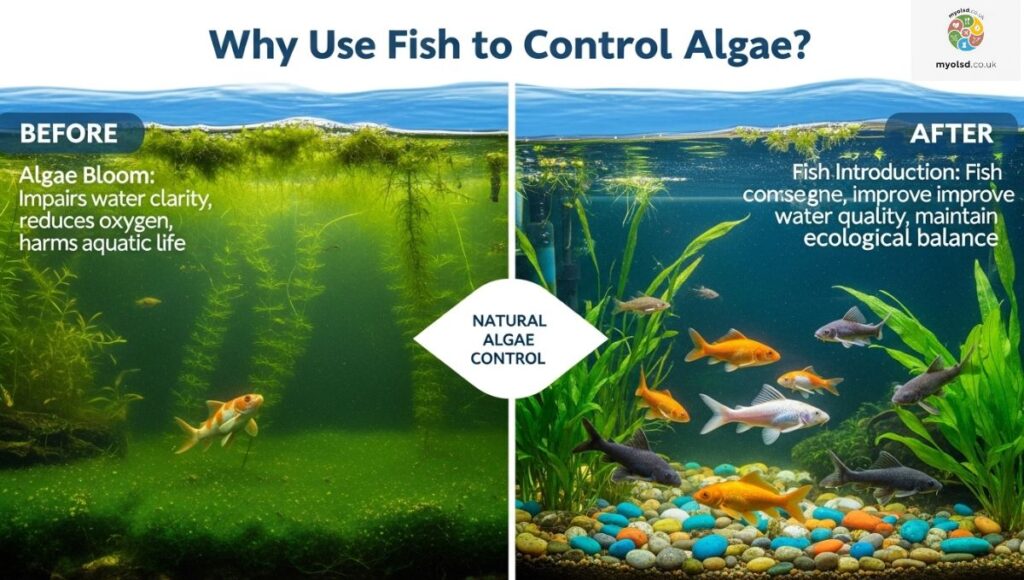
Fish provide a natural way to keep algae in balance. Unlike chemical algae treatment methods, they work with your pond’s food chain instead of against it. They eat algae, leftover fish food, and organic matter, reducing excess nutrient levels that cause blooms.
Also, algae-eating fish add beauty and activity to your pond. Watching koi, guppies, or mollies darting around feels far more rewarding than just pouring in chemicals or running a UV clarifier nonstop.
Choosing the Right Fish for Your Pond
Not every species is right for every pond. Think about:
- Pond size (a pleco needs space, while guppies fit smaller setups)
- Climate (do you face cold winters or warm tropical conditions?)
- Compatibility (some species are peaceful, others territorial)
- Maintenance level (snails are hands-off, grass carp need permits)
By matching your fish choices to your pond’s conditions, you avoid stress, overstocking, and future headaches.
Extra Tip: Combine Fish with Aeration
While fish help, they aren’t a silver bullet. The best results come from mixing strategies. Use oxygenating plants to shade water, an aerator to boost oxygen, and beneficial bacteria to reduce phosphates and nitrates. Even something as simple as tossing in barley straw can prevent algae bloom by releasing natural compounds as it decomposes.
When fish, plants, and good maintenance work together, algae doesn’t stand a chance.
Conclusion
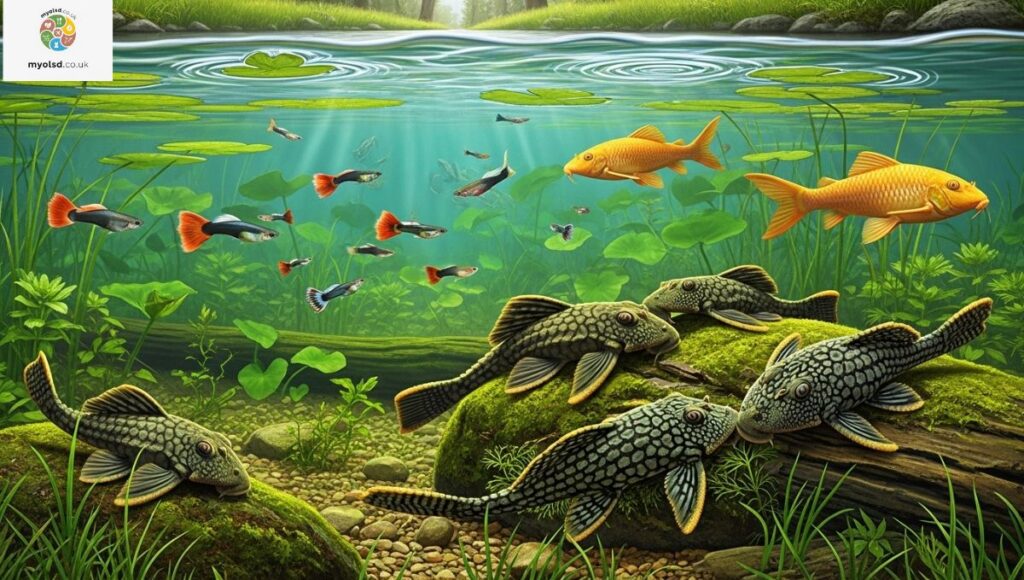
If you’ve been struggling with green water or slimy pond walls, stocking fish that eat algae in ponds may be the most natural solution. From koi and goldfish to loaches and plecos, there’s a wide variety of algae-eating helpers to choose from.
The key is balance: pick the right species for your pond size, climate, and ecosystem. Combine them with proper care, aeration, and plant cover, and you’ll enjoy a clear, healthy pond year-round. After all, a pond should be a peaceful retreat not a battle with algae every summer.
FAQs
What is the best fish to eat algae in a pond?
Grass carp and plecostomus are among the most effective algae eaters for ponds. They consume large amounts of algae and help keep the water balanced.
What is the fastest way to get rid of algae in a pond?
The quickest way is to combine algae-eating fish with aeration, beneficial bacteria, and shading plants. This reduces nutrients and prevents algae from returning.
Which fish eats algae?
Popular algae eaters include koi, goldfish, plecos, mollies, guppies, loaches, and otocinclus catfish. Each species targets different algae types.
What fish keep the pond clean?
Algae eaters like plecos, grass carp, mollies, and trapdoor snails help clean ponds naturally by eating algae and leftover food.
How to make pond water clear without killing fish?
Use natural methods like oxygenating plants, barley straw, UV clarifiers, and fish that eat algae in ponds. These balance the ecosystem safely.
Will guppies eat algae?
Yes, guppies nibble on soft green algae and biofilm. While not the strongest algae eaters, they help control small growths in ponds and aquariums.
What fish cannot live with guppies?
Aggressive or territorial species like large cichlids, oscars, or some loaches can harm guppies. Peaceful community fish are better tank mates.
Do tetras eat algae?
Most tetras don’t actively eat algae, though they may nibble on soft growth. They’re best paired with true algae eaters for clean ponds or tanks.
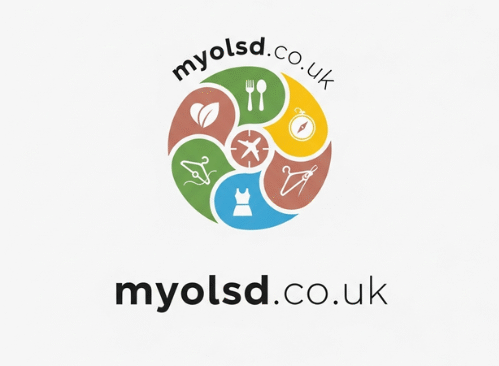
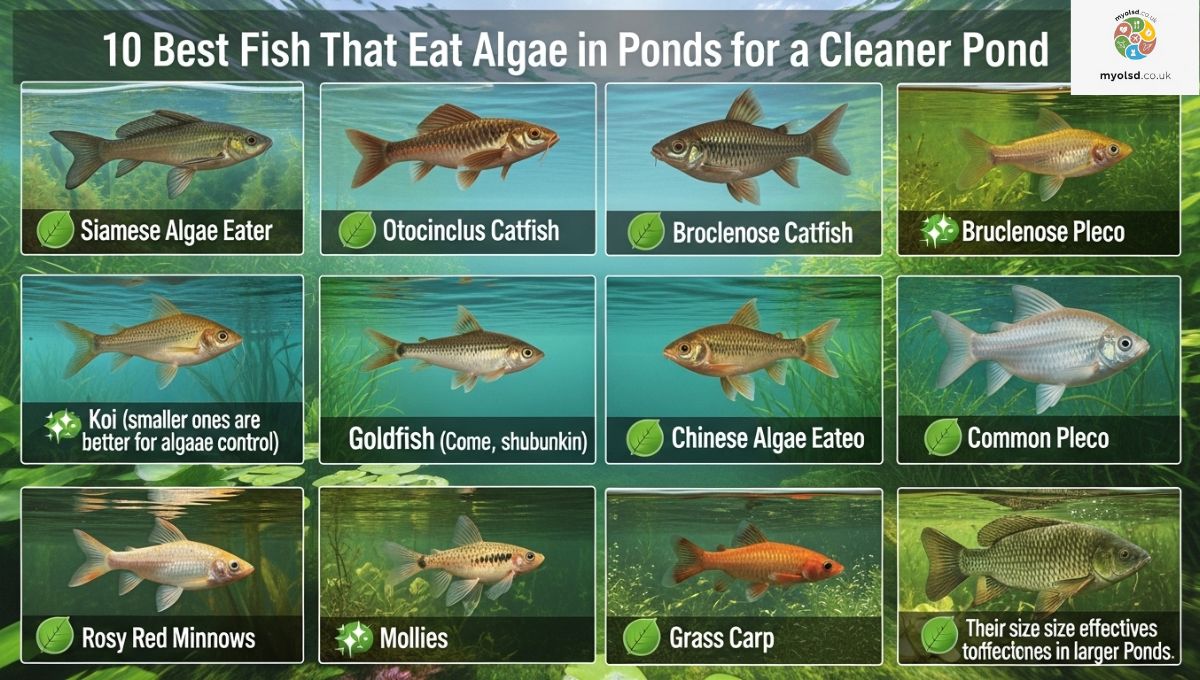
1 thought on “10 Best Fish That Eat Algae in Ponds for a Cleaner, Healthier Water Garden”